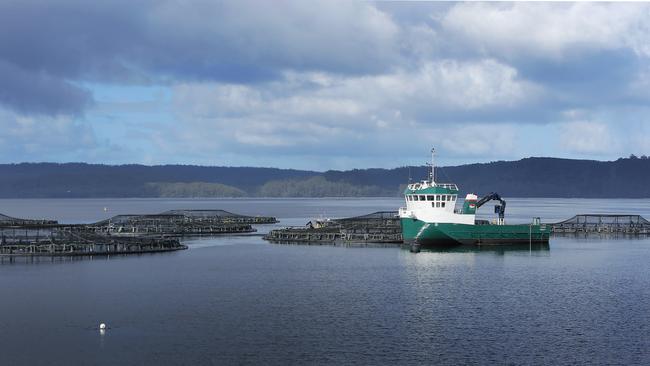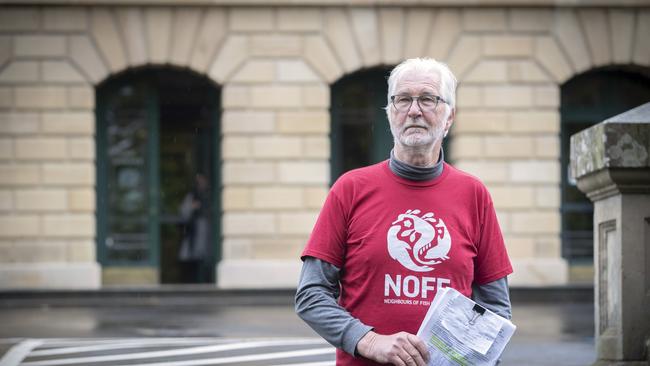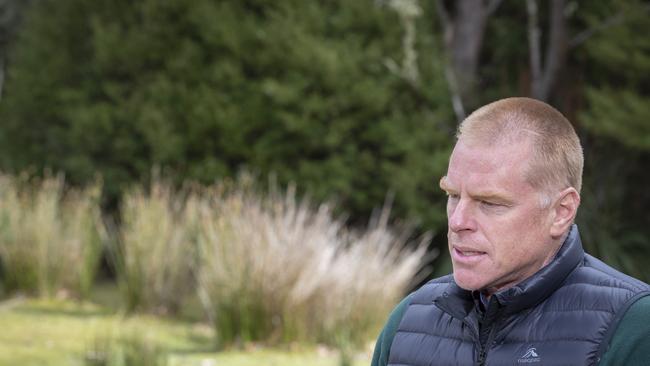RTI into Macquarie Harbour leases show 1.1m kg of dead salmon removed in seven months
Fish farming activists are calling for better transparency on fish farming mortality rates after shocking data reveals the volume of dead fish removed from Macquarie Harbour.

Tasmania
Don't miss out on the headlines from Tasmania. Followed categories will be added to My News.
About 1150 tonnes of dead salmon were removed from Macquarie Harbour from September 2023 to March this year, data from the state’s Department of Natural Resources and Environment (NRE Tas) reveals.
Fish farming activists Neighbours of Fish Farming (NOFF) submitted a Right To Information (RTI) request on the salmon mortality numbers for the past year, which were released on Wednesday. The data showed 1,149,795kg of salmon were removed.
During January this year, 313,895kg of dead salmon came from all Macquarie Harbour leases, the highest number recorded in the seven months of data.
Salmon Tasmania CEO Luke Martin said deaths occur in the aquaculture industry for many different reasons.

“There is no relevance between these numbers and the health of Macquarie Harbour, in fact, the Tasmanian Environment Protection Authority recently announced the current conditions in the harbour are the best in over a decade,” he said.
“Mortality rates in Tasmania’s salmon farming industry are regularly reported to and publicly disclosed by the Tasmanian government under the strictest reporting regimes applied to any farming sector.
However, NOFF president Peter George said the lack of transparency over fish farming data made it difficult to assess the true state of the industry.
“It is a ludicrously obscure industry,” he said.
“Without this transparency that you’d expect from an industry operating in public waterways, as you’ve got in Norway, Scotland, the United States, Canada – without that sort of transparency required of the regulator and through the legislation, then how are you supposed to draw conclusions?”
Mr George said the salmon mortalities represent over 10 per cent of the reported stocking density of Macquarie Harbour over just seven months.
He said this is at odds with the salmon farming industry’s claims of high animal welfare standards.

“We need to have the data on numbers and weights to make these assessments,” Mr George said.
Greens Environment spokesperson Vica Bayley MP said “diseased and deformed fish” make up part of the salmon deaths and show the “toxic truth and animal welfare horror” of salmon farming.
“Industry insiders have suggested stocking numbers have been causing huge mortality numbers all over the state,” he said.
“It has to be recognised that Macquarie Harbour carries only a fraction of the state’s salmon biomass.
“If these numbers are extrapolated over the whole state, there is likely well over 20 million kilograms of dead fish hauled out of our waters and dumped.”
Mr Bayley alleged that the EPA’s move at the recent Budget Estimates hearing to deny data on salmon mortalities exists was at the salmon industry’s request.

“The salmon industry’s dirty secret is coming to light and the government needs to explain to Tasmanians why they think this is okay,” he said.
“We need the exact numbers of mortalities, we need to know what these poor animals are dying from and we need to know what effect this is having on our precious waterways and native wildlife.”
A Tasmanian Government spokesperson said it routinely receives and publicly discloses
“mortality notifications associated with salmon farming operations”.
“Mortality can occur for a number of reasons with notifications of significant or sustained mortality events required to ensure appropriate biosecurity and animal welfare measures can be implemented where necessary,” the spokesperson said.
“Recent scientific studies reveal dissolved oxygen levels in the Harbour are the highest in a decade.
“Activists should back in the science and cease their political campaigning against Tasmanian jobs.”
Salmon carcasses (kg) for all Macquarie Harbour leases by month
September 2023 – 75,443
October 2023 – 107,126
November 2023 – 118,134
December 2023 – 265,740
January 2024 – 313,895
February 2024 – 172,064
March 2024 – 97,393





